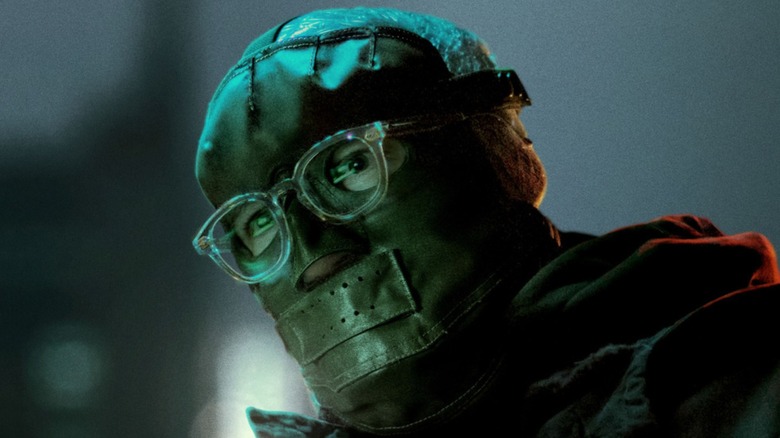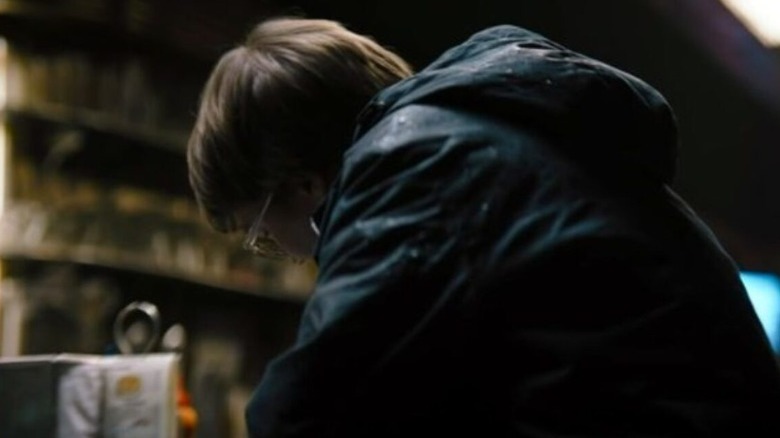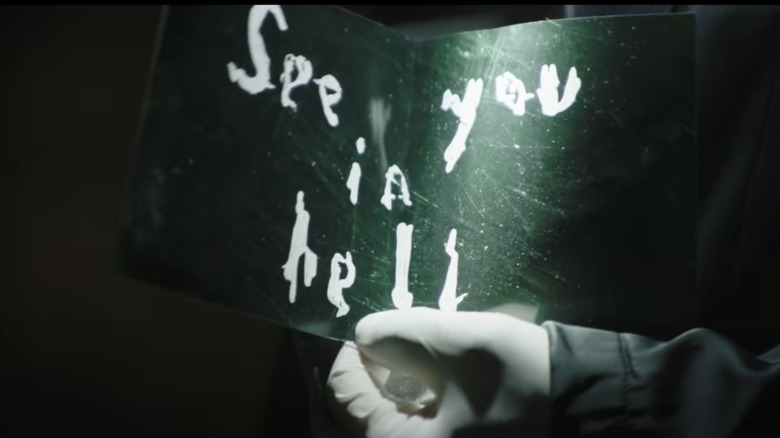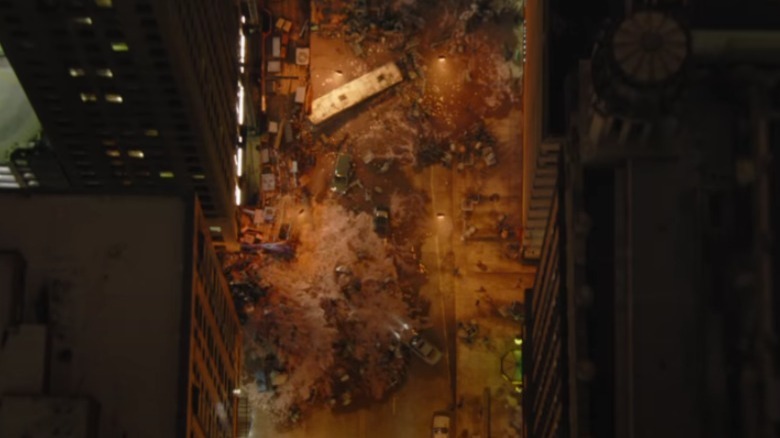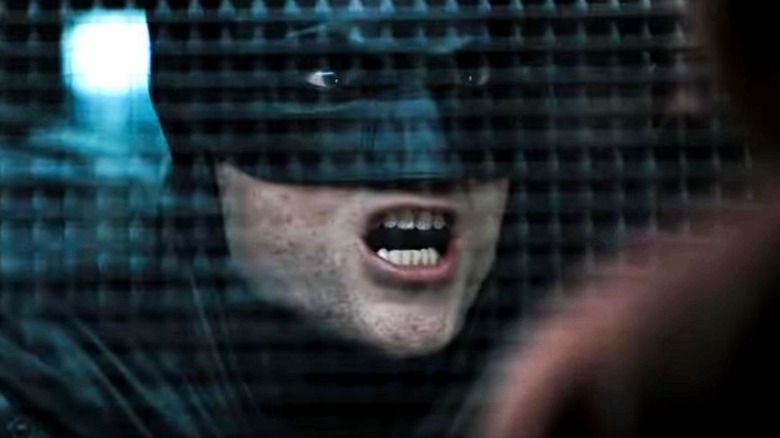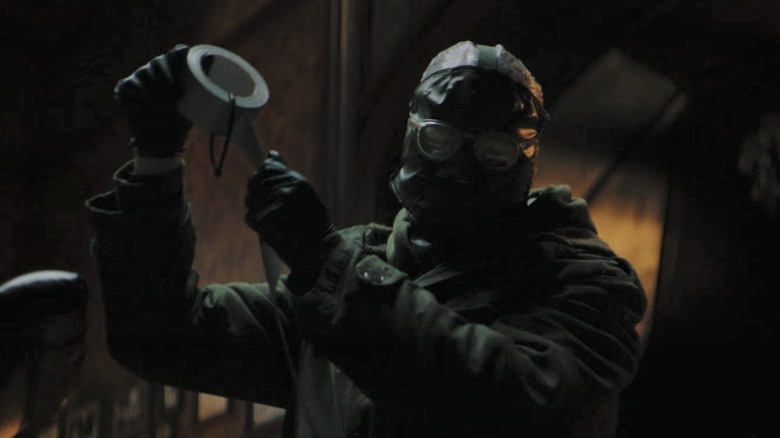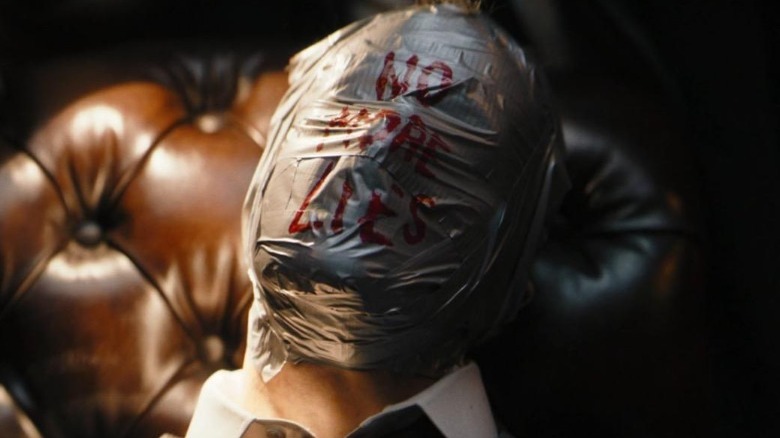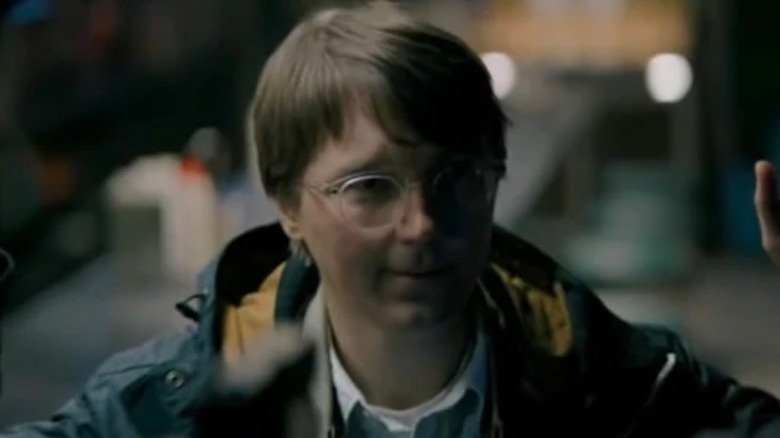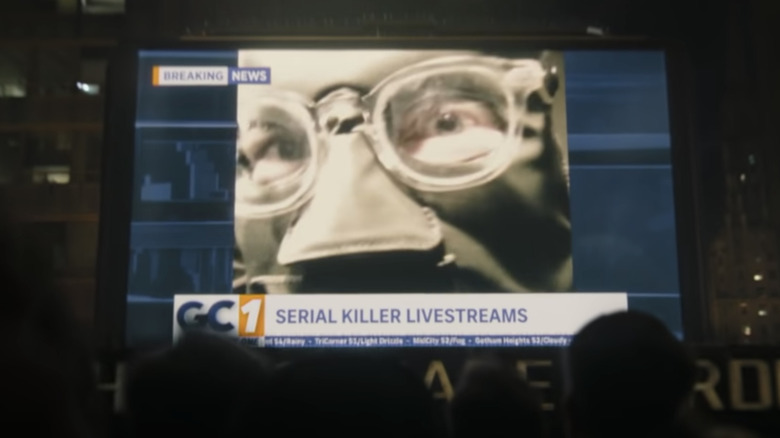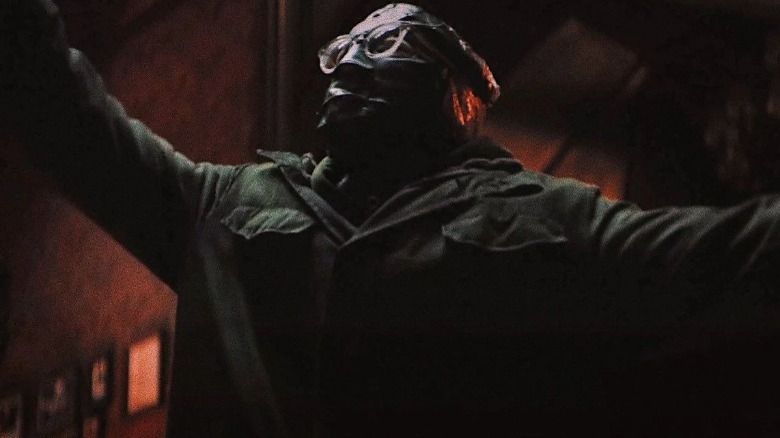All The Ways The Batman's Riddler Was Different From Others
Gotham City is a dark and dreary place, often ground zero for the creation of the unimaginable horrors that the crime-fighting vigilante Batman must contend with night after night. "The Batman" portrays a Gotham that is broken at its very core, with leadership who have already been purchased by the mob. Corruption runs amok and half the city's most prominent figureheads make themselves cozy in the seedy den known as the Iceberg Lounge — a gathering place for the lowest forms of life the city can produce. Robert Pattinson's Batman has his work cut out for him if he intends to bring hope to the good people of Gotham as envisioned by director Matt Reeves.
Of course, crime often begets more crime. Those who have felt the sting of violence and selfishness from others feel the need to either partake themselves or retaliate with a fiery wrath that ends in bloodshed. The Riddler (Paul Dano) falls in the latter category. He takes up his own crusade against Gotham's corruption with a bloody vindictiveness like nothing the city has seen before, and his villainy is unmatched in Batman's fledgling two-year career — at least so far. Reeves has created a fascinating version of the famous Batman villain, one who shakes up the status quo and offers a fresh perspective. There are many ways this Riddler is far and away different from any of the character's other portrayals. Let's take a look at all of them.
Warning: this article contains spoilers for "The Batman."
His name is Edward Nashton
Even casual Batman fans are usually familiar with the Riddler's real name, Edward Nigma. It's a pretty obvious pun — "E. Nigma" is reminiscent of the word "enigma," referencing the mysteries and puzzles that the Riddler loves so much. Some viewers may be surprised, then, that he has a slightly different alias in "The Batman," going instead by the less familiar Edward Nashton. That name wasn't invented for the movie, though. In DC Comics, it actually is the Riddler's real name — or at least, it was for 25 years. Between 1986 and 2011, the period known in DC continuity as New Earth, Nashton was Riddler's canonical name, though he did change it to Nigma as part of his criminal ambitions. After the events of "Flashpoint," however, New Earth gave way to the New 52 and Prime Earth, and the Riddler's real name reverted to the less conventionally spelled Edward Nygma.
Live-action iterations of the character in the past, including the stars of "Batman Forever" and the "Gotham" TV series, have used the surname Nigma or Nygma, which, while recognizable, is also a bit campy. Such an on-the-nose reference to the character's obsessions doesn't really fit with the tone or aesthetics of "The Batman." As a result, for the first time, we're seeing a live-action iteration of the character bear the name Edward Nashton, Riddler's true name for a quarter of a century.
He was orphaned
The most famous orphan in Gotham City is undoubtedly Bruce Wayne, a child of wealthy socialites whose tragic deaths were no secret to the population at large. In "The Batman's" version of the tale, Bruce became something of a recluse following the deaths of his parents, at least in the public perception — in truth, he was biding his time and completing his training to emerge as the Dark Knight. Still, Bruce rarely shows his face in public.
The Riddler has a bone to pick with Bruce, mostly because of the sins of his father, Thomas Wayne, who purportedly associated with the mob. However, deep down, the Riddler is jealous of Bruce, the famous orphan, the one who didn't have to live in squalor in the decrepit Wayne Orphanage after the promised funding for renewing the grungiest parts of Gotham was siphoned away by corrupt city officials for personal gain. That was the harsh childhood the Riddler endured, never receiving the proper care or attention displaced children deserve. Instead, he grew to resent the city and the people that took from him and others like him. Little did the corrupt Gotham leadership realize that their greed would give birth to their future demise.
He's horrifying, not humorous
"The Riddler" is typically portrayed as an egomaniac with a morbid funny bone who fancies himself the smartest man in the room at all times. Being of "superior" intellect, he can't help but laugh and mock those beneath him, which is just about everyone. Both the Frank Gorshin and Jim Carrey versions of the character find humor in their own hijinks — they're outlandish and cartoony villains who crack jokes, make puns, and belittle their opposition with sarcastic wit.
"The Batman," on the other hand, presents a Riddler absolutely devoid of any such feeling, displaying a subtle rage instead. Like many Batman villains, he's a dark reflection of the Dark Knight — they both exact vengeance on the wicked, they both wear masks, and they both want criminals to fear them. Their intellects are comparable, but the Riddler isn't fixated on his own superiority (though he does comment at one point that Batman isn't as smart as Riddler thought he was). Where previous incarnations were mischievous and colorful, this Riddler is dark and terrifying, a psychopathic stalker who horrifically bludgeons his victims in the shadows of their own homes. He still deals in puzzles, but Paul Dano's performance, alongside expert camera work, creates a striking portrait of an unhinged man unleashing his own brand of righteous fury upon Gotham City. The Riddler of "The Batman" would fit comfortably in a slasher horror film, and unlike his more comedic predecessors, he has little, if anything, to laugh about.
His master plan actually succeeds
The Riddler's plots are always getting foiled by Batman. Sure, he's murdered many people over the years and he has enacted many destructive plots. However, "The Dark Knight Rises" aside, it's rare for any villain to actually succeed in subverting Batman's expectations and wreaking real devastation. But in the third act of "The Batman," the Riddler succeeds in his grand plan to unleash a flood upon Gotham to "cleanse" the city of its filth. Batman is still an amateur compared to his later, more refined years on the job — he has a lot of growth ahead of him, and he most certainly must continue to sharpen his skills. This is a movie where Batman does make mistakes, including failing to deduce the Riddler's final plot.
The film's true resolution is Batman's acknowledgement that he must be more for the people of Gotham than a vigilante pounding baddies into the pavement every night. He must be a symbol of hope. When Batman prevents mayoral candidate Bella Reál from being assassinated and is seen providing aid and relief to victims of the flooding on the daily news cycle in Arkham, the Riddler is angered — the last thing he wanted to do was bring a sense of unity to the people of Gotham and bolster a hero, a champion for the people. Still, Riddler did at least win the battle, even if he won't win the war.
He wants to partner with Batman
In the colorful pages of DC comics, the Riddler is often as pompous as they come. He would never share the spotlight — he craves it too much. Many of his villainous team-ups have been fractured by this egocentrism. The Riddler is destined to be a one-man show, and he'll live out the rest of his days trying to one-up and defeat the Batman if it's the last thing he does.
Despite the Riddler's comic book predilection for hoarding all the notoriety, Paul Dano's take on the character is markedly different. While the Riddler obviously prides himself on his capability to toy with law enforcement, much like other prominent serial killers in history, he ultimately has one objective in mind: eliminate corruption. It doesn't matter how he does it. As such, the Riddler finds a sense of kinship with the Dark Knight, seemingly a crusader for justice just like him. They both punish the wicked under the cover of shadows, after all. The Riddler's messages for the Batman aren't a taunting game — they're an invitation to join forces. For most of the film, the Riddler believes the Batman is actually on his side, simply because their goals seem to align. It's only when the Riddler is locked up that he realizes the Batman was never aiding his cause.
He's almost an anti-hero
At his villainous heights, the Riddler's aggression typically targets the weak and powerful alike. His primary objective is to elevate himself as a notoriously brainy criminal and to exert dominion over all, including Batman. That's simply the nature of the game for an extreme narcissist like the Riddler. From time to time, his humanity has shown through, but rarely, and the previous live-action versions of the character all fit the mold of a power-hungry individual bent on destroying Batman.
It's extremely rare, then, to see the Riddler portrayed as an anti-hero of sorts. The 2013 video game "Batman: Arkham Origins" includes an early-career Edward Nygma who has hidden extortion data all throughout the city highlighting Gotham's deep rot, and the version of the character from "Batman: Earth One" is also a serial killer waging war on the corrupt. These are the only instances in recent memory in which the Riddler flirts with anti-hero status ... until "The Batman," which definitely counted "Batman: Earth One" among its inspirations. The Riddler's war is seemingly a righteous one in his own eyes — he wants nothing more than to see the evil and greedy denizens of Gotham suffer and pay for their injustices. It's a Riddler we haven't seen before in live-action, and it adds another layer to the tortured character.
He stalks and savors his kills
In the comics, the Riddler may be kidding himself when he says he's not mentally unstable like the rest of Batman's rivals. There's a certain degree of obsession and megalomania that must be involved for a villain like the Riddler to commit to a never-ending conflict with a man dressed in a bat costume. Killing isn't a highlight of the Riddler's career; it's merely a means to an end. Typically, the puzzle-spinning crook finds joy in outwitting others, especially a prominent and intelligent figure like the Batman.
Dano's Riddler certainly has a few screws loose, but that's the cost of a lifetime of neglect, living as an outcast in a cruel city like Gotham. In "The Batman," the Riddler seems to be the exact opposite of his comic book counterpart — the riddles are a means to an end, not the end themselves. This Riddler isn't seeking to outsmart anyone. He derives joy not from a feeling of superiority, but from the satisfaction of knowing he's about to end someone who's done the city dirty. He savors his kills. The introductory scene in which the Riddler stalks the mayor in his own home is chilling ... but he doesn't kill the man immediately, even though he has the chance. The mayor's family is out trick-or-treating and no one else is around, yet the Riddler remains in the shadows, savoring the moment. It's a distinction that adds a lot to the horror element of the character.
He was a forensic accountant
"The Batman" paints a bleak picture of Edward Nashton's history, one tainted by the memory of growing up in Wayne Manor, which was repurposed as an orphanage, and then seeing both the building and the lives of his fellow orphans fall into disrepair. When the funding dried up thanks to Gotham's greed, the orphans were forced to live in squalor. Fortunately, Edward came up with his signature survival strategy early on — even as a child, he fixated on solving puzzles. The hobby helped him to bide his time and not focus so much on his tragic life.
Nashton's penchant for enigmas served him later in life when he became a forensic accountant, a career that actually led directly to him donning his mask and taking up arms against the corrupt. The skills he nurtured enabled him to piece together the grand scheme of the theft of Thomas Wayne's renewal fund, which was ripe for the plucking after Wayne's death. That was the moment Nashton realized he owed his dark past to Gotham's shady elite and vowed to bring them down.
He amasses radical followers online
Every villain needs henchmen. There's no way men like the Riddler could contend with Batman physically on their own — the Dark Knight is far too much of a force to be reckoned with from a fisticuffs standpoint. Loyal thugs and followers are essential to making a splash Gotham City, and most of the time, villains already have them when the movie, comic, or video game begins, with no details on how, exactly, such loyalty was earned. We're left to infer that the henchmen are either well-paid, terrified, or both, and while that's probably a reasonable assumption, "The Batman" does things differently.
"The Batman" depicts the Riddler in the modern age of social media, attracting hundreds of followers throughout Gotham via online ramblings about his crusade. Essentially, he's both radicalizing and recruiting followers for his war against Gotham's elite — though instead of staging some sort of righteous revolution, the Riddler only seeks to exact vengeance. Those like-minded individuals who have also been victims of corruption show up en masse to help assassinate a mayoral candidate and terrorize the people of the city in a modern twist on villainy in an age of widespread online interaction.
He has a new costume
The Riddler often has a distinct design that's instantly recognizable to comic book fans. Outfitted with a black or green domino mask, he fancies himself a fashionista, donning a green bowler hat and a green suit adorned in question marks. There have been several variations on that theme over the years, including Jim Carrey's eccentric showstopper in 1995's "Batman Forever," but the Riddler's appearance has typically been as distinct as it is familiar.
"The Batman," in contrast, presents a villain who seeks to conceal his identity for obvious reasons — at least initially. He wears a mask that covers his entire face, along with a cargo-style jacket, utility pants, and combat boots. This new attire makes complete sense in the world of "The Batman," where maneuvering through the city is going to result in some grime and getting revenge means getting your clothes dirty along with your hands. Dano's Riddler has neither time nor use for flashy spectacle. His costume design is simple but already iconic, conveying everything the people of Gotham need to know about the man wreaking havoc on their city: He's enigmatic, he's practical, and he means business.
